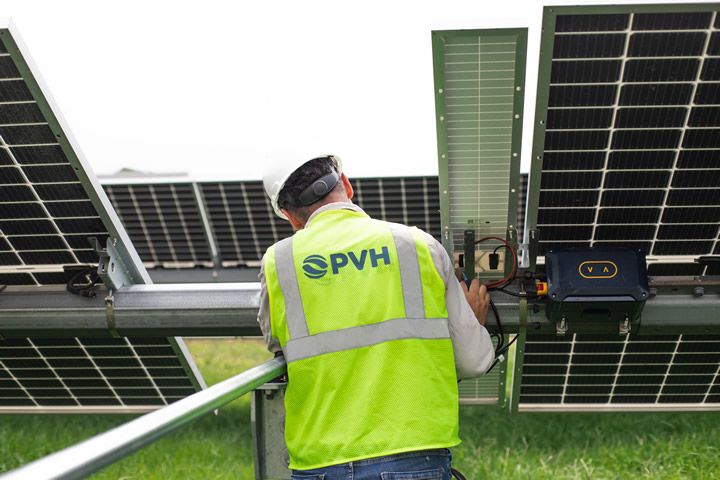The AxoneDuo Infinity and our tracker control and SCADA systems, such as the innovative DBox5, all in-house technology, feature direct motor control capabilities and use LoRa technology for secure, long-range wireless communication with the Network Control Unit (TBOX).
 Advancements in Solar Tracker Technology
Advancements in Solar Tracker Technology

Q&A with Rodolfo Bitar, Vice President of Business Development | PV Hardware USA
PVH USA is renowned for its advancements in solar tracking systems. Could you elaborate on the latest innovations that set PVH USA apart from other providers in the industry?
PV Hardware USA (PVH USA) has introduced several innovations in our solar tracking systems that set us apart. The AxoneDuo Infinity offers a remarkable level of flexibility, accommodating independent rows and allowing customizable connections to meet specific terrain requirements. This system enables various configurations to optimize project performance and reduce costs. Its unlinked mode allows for the free activation of independent rows equipped with individual motors, which can be implemented even after installation, providing maximum adaptability to each project's circumstances.
Beyond just trackers and structures, PVH prioritizes safety and performance in all conditions. Our tracker control and SCADA systems, such as the innovative DBox5, all in-house technology, feature direct motor control capabilities and use LoRa technology for secure, long-range wireless communication with the Network Control Unit (TBOX).
This ensures efficient data transmission and precise monitoring and control of solar trackers via SCADA and the PVH application, accessible even through NFC for agile and secure management. These innovations enhance operational efficiency, durability, and performance, ensuring our customers achieve the maximum return on investment for their solar projects.
Solar trackers are known to improve the energy output of solar panels and fields. Could you explain how PVH USA's trackers achieve this and what specific advantages they offer compared to fixed installations? Additionally, where do you see the future evolution of solar trackers in terms of technology and applications?
Our solar trackers are designed to optimize the orientation of solar panels throughout the day, thus maximizing solar energy capture and increasing energy production compared to fixed installations. We use standard tracking algorithms that account for E-W inclinations and help reduce shadows between rows at sunrise and sunset to increase solar energy collection. On average, our trackers can increase energy production by up to 25% compared to fixed installations.
However, taller trackers on uneven terrain can cast shadows on lower neighbors, causing them to not generate as much energy as expected, as shading on a single cell can affect the output of the entire module.
Our 3D Backtracking algorithms minimize the problem of standard backtracking. They are adapted to new types of solar trackers and to the complexity of the terrains where PV plants are built.
Looking ahead, we see an evolution towards even more intelligent and autonomous systems, with greater integration of IoT technologies and advanced analytics to improve efficiency and reduce operational costs.
Another major advantage of PVH trackers is the active hail stow protection system. Fixed systems are usually designed with tilts less than 30°, which are shallow and pose a significant risk during hailstorms. PVH has implemented active hail protection systems that include advanced warning systems from market-leading weather services, a market-leading hail stow position of 75°, and onsite hail sensors that provide an additional layer of protection during unpredictable hailstorms. PVH designs its trackers to stow into or away from the wind, so during hailstorms, the tracker will stow quickly, in under 5 minutes, to the nearest 75° stop to ensure the safety of both the tracker
and the modules.
Looking ahead, we see an evolution towards even more intelligent and autonomous systems, with greater integration of IoT technologies and advanced analytics to improve efficiency and reduce operational costs.

PVH USA recently established one of America’s largest solar tracker manufacturing facilities in Houston. What factors influenced PVH's decision to invest in this market, and how does the strategic geographic location in Houston contribute to your competitive advantage and growth plans in America and beyond?
PVH USA’s decision to establish our manufacturing headquarters in Houston was driven by several key strategic factors. First and foremost, Houston offers exceptional infrastructure and a highly skilled workforce, which are critical for advanced manufacturing operations. Additionally, Houston's central geographic location in the United States provides an optimal position for efficient distribution across the country, enhancing our ability to respond swiftly to market demands. This central location also facilitates international shipping, allowing us to serve global markets more effectively.
The strategic investment in Houston allows us to strengthen our innovation and development capabilities, positioning us to meet the evolving needs of the solar energy market. By anticipating supply chain needs and managing logistics proactively, we can mitigate potential space and equipment issues, ensuring smoother operations and timely deliveries. Furthermore, the enhancement of local manufacturing and supply chains reduces our dependence on external suppliers, providing greater control over production quality and timelines.
PVH operates three manufacturing plants in strategic locations worldwide, Spain, the U.S., and Saudi Arabia. This global network enables us to minimize external dependencies and streamline our supply chain, ensuring robust and reliable operations. Our agreements with major freight forwarders and shipping companies secure preferred routes and lower transportation costs, further enhancing our competitive edge.
By identifying and addressing bottlenecks within our supply chain, we maintain a high level of efficiency in the timely and complete delivery of products. This strategic approach not only supports our growth plans in America but also aligns with our broader goal of adapting our supply chain to the long-term durability and success of our projects.
Can you share any details about PVH USA’s forthcoming client projects? What factors contributed to securing these clients, and how do these partnerships align with PVH's strategic goals and market expansion efforts in the U.S.?
At PVH, we are working with all Tier 1 EPCs across the United States. Our commitment goes beyond merely providing solar trackers; we strive to demonstrate, daily, the advanced technology, innovation, and expert guidance that set us apart in the industry.
Our approach is centered on maintaining transparency and open communication with our clients throughout every stage of the project. From initial consultation to final installation, including critical logistics management, we ensure that our clients have complete confidence in the process. This end-to-end partnership is what defines PVH and reinforces our position as a leader in the solar energy sector.
Tell us more about your project with Moss?
We are excited to announce upcoming projects with Moss construction, where PVH will supply 200 MW of our cutting-edge AxoneDuo Infinity solar trackers in Texas.
This project highlights our ability to collaborate with top-tier companies to deliver large-scale, efficient, and cost-effective solar solutions.
Can you elaborate on how partnerships, such as with Kinematics, a manufacturer of engines, are integral to PVH's approach in meeting these requirements and enhancing its market story?
Partnerships with companies like Kinematics are crucial to our strategy. Working with leaders in engine manufacturing allows us to integrate high-quality, reliable components into our tracking systems, thereby enhancing overall performance and durability. These collaborations help us maintain our promise to deliver innovative and high-quality solutions to our customers.
Looking ahead, what emerging trends do you foresee shaping the future of solar technology, and how is PVH USA preparing to leverage these trends to stay ahead in the market?
 We foresee emerging trends such as artificial intelligence, advanced energy storage, and smart grid integration significantly impacting solar technology. PVH USA is investing in research and development to leverage these trends and offer innovative solutions that will keep our customers at the forefront of the industry.
We foresee emerging trends such as artificial intelligence, advanced energy storage, and smart grid integration significantly impacting solar technology. PVH USA is investing in research and development to leverage these trends and offer innovative solutions that will keep our customers at the forefront of the industry.
There is much discussion about the need for domestic content for finished product. What is your timeline to reach 100% domestic content? How are you achieving this?
We are committed to increasing domestic content in our products and have established a plan to reach 100% domestic content by 2025. To achieve this, we are investing in our local supply chain, establishing strategic partnerships with domestic suppliers such a kinematics, and increasing our internal manufacturing capacity 16 GW by 2025.
The content & opinions in this article are the author’s and do not necessarily represent the views of AltEnergyMag
Comments (0)
This post does not have any comments. Be the first to leave a comment below.
Featured Product

